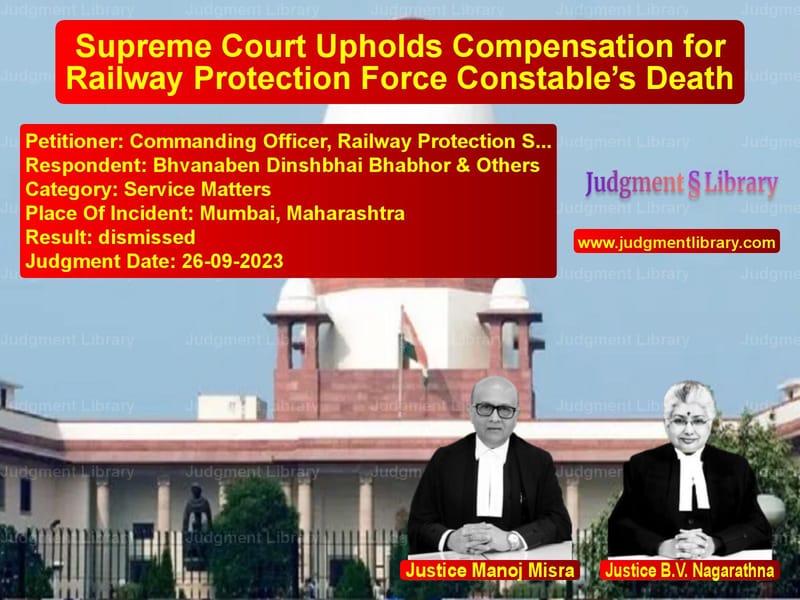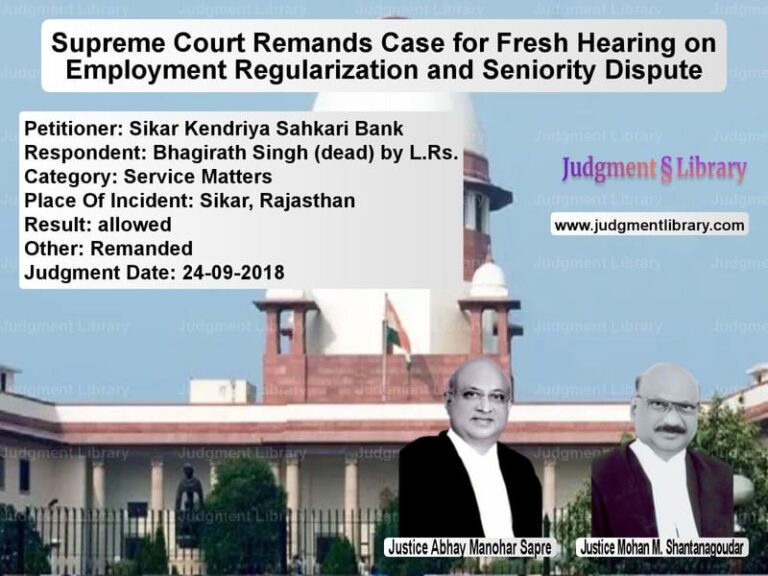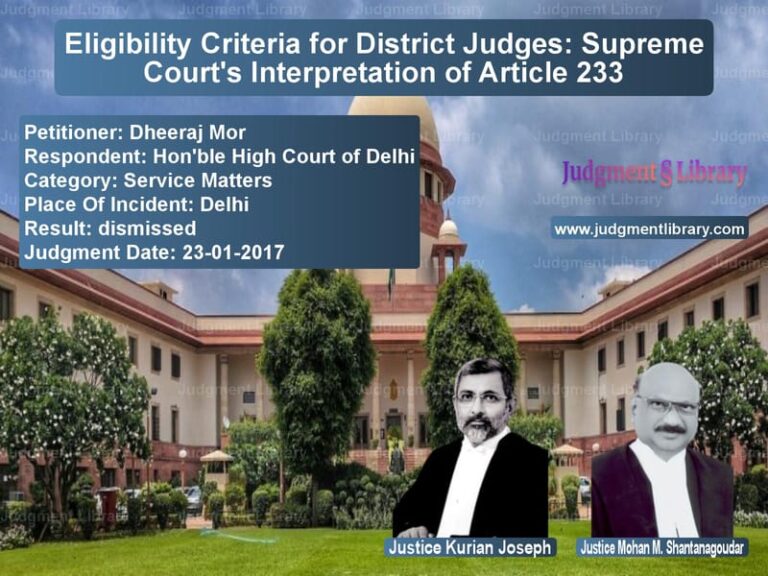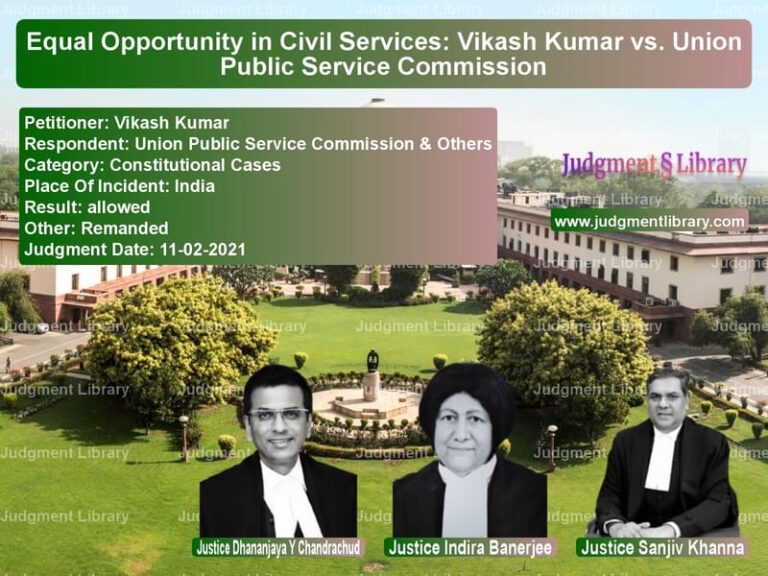Supreme Court Upholds Compensation for Railway Protection Force Constable’s Death
The Supreme Court of India has ruled in favor of the dependents of a deceased Railway Protection Force (RPF) constable, affirming their right to compensation under the Employees’ Compensation Act, 1923. The case, Commanding Officer, Railway Protection Special Force, Mumbai v. Bhvanaben Dinshbhai Bhabhor & Others, centered around whether a constable in the RPF qualifies as a ‘workman’ under the law, given the designation of the RPF as an Armed Force of the Union.
Background of the Case
The case stemmed from the death of a constable who was serving in the Railway Protection Special Force (RPSF), a unit of the RPF. He died in an accident during the course of his employment on April 23, 2008. His dependents, led by his widow, filed a claim for compensation under the Employees’ Compensation Act, 1923 (formerly known as the Workmen’s Compensation Act, 1923).
The Commissioner for Employees’ Compensation awarded the claimants a compensation of Rs. 4,33,820, payable within 30 days along with an interest rate of 9%. However, the employer—Commanding Officer of the Railway Protection Special Force, Mumbai—challenged the award, arguing that the deceased was not a ‘workman’ under the Act since the RPF is designated as an Armed Force of the Union under the Railway Protection Force Act, 1957.
The Gujarat High Court dismissed the employer’s appeal, prompting the employer to escalate the matter to the Supreme Court.
Key Legal Issues Before the Supreme Court
- Whether a constable in the RPF is classified as a ‘workman’ under the Employees’ Compensation Act, 1923.
- Whether RPF personnel, by virtue of being part of an Armed Force of the Union, are excluded from seeking compensation under the Act.
- Whether alternative remedies available under the Railways Act, 1989, preclude claims under the Employees’ Compensation Act.
Arguments by the Appellant (Commanding Officer, RPSF)
The appellant made the following arguments:
- As per Section 3 of the Railway Protection Force Act, 1957, the RPF is an Armed Force of the Union, and therefore, its members do not qualify as ‘workmen’ under the Employees’ Compensation Act.
- The Employees’ Compensation Act, 1923, excludes members of the Armed Forces from its ambit.
- The deceased constable was not covered under any of the entries listed in Schedule II of the Employees’ Compensation Act, which defines who qualifies as a workman.
- Compensation claims should have been filed under the Railways Act, 1989, which provides remedies for railway employees.
Arguments by the Respondents (Dependents of the Deceased Constable)
The respondents countered with the following arguments:
- Section 2(1)(n) of the Employees’ Compensation Act states that a ‘workman’ includes a ‘railway servant’ as defined in Section 2(34) of the Railways Act, 1989.
- Section 2(34) of the Railways Act includes RPF personnel as railway servants, thereby making them eligible under the Employees’ Compensation Act.
- While the RPF is designated as an Armed Force, it primarily serves a security function and is not comparable to the military forces excluded from the Employees’ Compensation Act.
- The legislature did not exclude the Employees’ Compensation Act from applying to RPF members, as evident from the exclusions specified under Section 19 of the RPF Act, 1957.
Supreme Court’s Analysis
1. Definition of ‘Workman’ Under the Employees’ Compensation Act
The Court examined the statutory definitions and held:
“The definition of ‘railway servant’ under the Railways Act, 1989, includes members of the RPF. As per Section 2(1)(n) of the Employees’ Compensation Act, a ‘railway servant’ is considered a workman unless specifically excluded. The deceased constable was not explicitly excluded.”
2. Armed Forces Exclusion Under the Employees’ Compensation Act
The Court noted that while members of the Armed Forces of the Union are excluded from the Employees’ Compensation Act, this provision was originally intended to apply to the military forces of the British Empire before India’s independence. The Court ruled:
“The phrase ‘Armed Forces of the Union’ in the exclusion clause of the Employees’ Compensation Act must be interpreted in the context of its legislative intent. RPF members perform security duties but are not equivalent to the military or paramilitary forces traditionally covered under the exclusion.”
3. Availability of Alternative Remedies Under the Railways Act
The Court addressed whether the existence of compensation provisions under the Railways Act, 1989, barred claims under the Employees’ Compensation Act. It ruled:
“The existence of an alternative remedy under the Railways Act does not bar a claim under the Employees’ Compensation Act. Section 128 of the Railways Act specifically preserves the right to seek compensation under other laws.”
Supreme Court’s Judgment
The Supreme Court dismissed the appeal and upheld the compensation awarded by the Workmen’s Compensation Commissioner and the Gujarat High Court. The key directives included:
- The deceased constable qualifies as a workman under the Employees’ Compensation Act.
- The exclusion for Armed Forces does not apply to the RPF.
- The employer must pay Rs. 4,33,820 to the dependents, along with 9% interest.
The Court concluded:
“The legislative intent was never to exclude members of the Railway Protection Force from compensation benefits under the Employees’ Compensation Act.”
Implications of the Judgment
This ruling has significant implications:
- Expanded Protection for RPF Personnel: The judgment clarifies that RPF members can claim compensation under the Employees’ Compensation Act.
- Restricts Arbitrary Exclusions: It limits the blanket application of the ‘Armed Forces of the Union’ exclusion clause.
- Ensures Legal Clarity: The decision affirms that alternative remedies under the Railways Act do not preclude claims under the Employees’ Compensation Act.
Conclusion
The Supreme Court’s ruling in Commanding Officer, Railway Protection Special Force, Mumbai v. Bhvanaben Dinshbhai Bhabhor & Others upholds the rights of RPF personnel and their families to compensation under the Employees’ Compensation Act, 1923. By ensuring clarity in statutory interpretation, the Court has reinforced the principle that security personnel serving in railway forces are entitled to the same protection as other railway servants.
Petitioner Name: Commanding Officer, Railway Protection Special Force, Mumbai.Respondent Name: Bhvanaben Dinshbhai Bhabhor & Others.Judgment By: Justice Manoj Misra, Justice B.V. Nagarathna.Place Of Incident: Mumbai, Maharashtra.Judgment Date: 26-09-2023.
Don’t miss out on the full details! Download the complete judgment in PDF format below and gain valuable insights instantly!
Download Judgment: commanding-officer,-vs-bhvanaben-dinshbhai-supreme-court-of-india-judgment-dated-26-09-2023.pdf
Directly Download Judgment: Directly download this Judgment
See all petitions in Public Sector Employees
See all petitions in Pension and Gratuity
See all petitions in Compensation Disputes
See all petitions in Judgment by Manoj Misra
See all petitions in Judgment by B.V. Nagarathna
See all petitions in dismissed
See all petitions in supreme court of India judgments September 2023
See all petitions in 2023 judgments
See all posts in Service Matters Category
See all allowed petitions in Service Matters Category
See all Dismissed petitions in Service Matters Category
See all partially allowed petitions in Service Matters Category







